Describing the 30th annual Invention Convention at MTSU as “standing-room only” is a bit of an understatement when there are two levels of standing room: adult height and the young inventors’ roughly elbow-high-to-an-adult elevation.
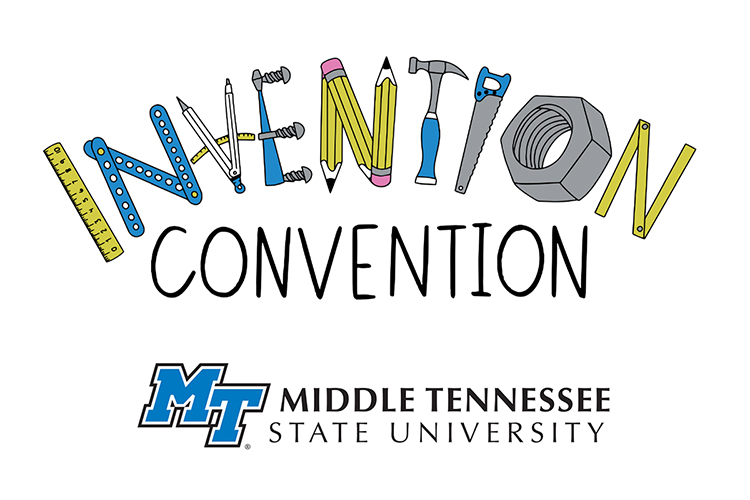
The yearly hive of creativity is crowded enough when accommodating the 801 young inventors from the fourth, fifth and sixth grades across 41 Midstate schools and the poster-board-sized displays for their 401 gadgets, games, business innovations and fascinating contraptions at this year’s event.
Now add the hundreds of teachers, parents, grandparents, siblings and other supporters who mill around in the Student Union ballroom with duct tape, spare batteries, juice, biscuits, water, hugs and words of encouragement while dozens of students, faculty and staff from MTSU’s College of Education scurry by to help with setup, judging and nonstop questions.
No wonder the youngsters often take refuge under the display tables to read, play the games they’ve invented or downloaded on their tablets, talk and await the guest speakers and awards announcements.
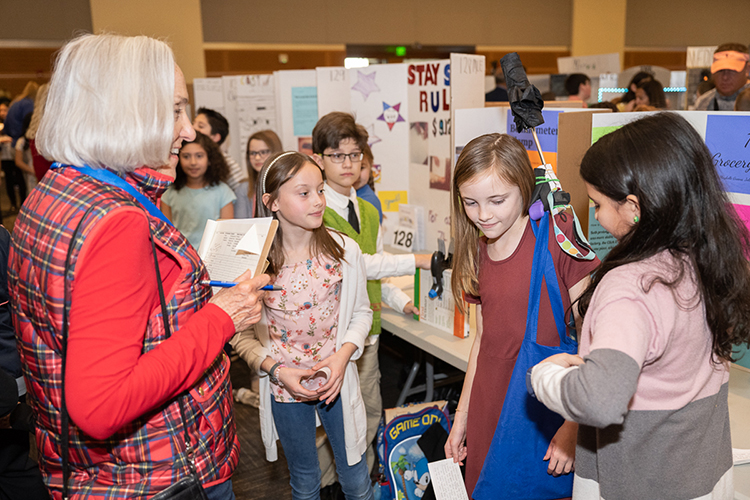
It’s quite a change from the 54 children who ventured into the cavernous Tennessee Room of the James Union Building in April 1993 to demonstrate their unique games, toys and ways to save time.
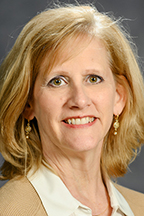
“I still have the MTSU magazine with a picture of one of the winners — ‘Coloring Book for the Blind’ by Megan Stapleton from West Hills Elementary (in Lewisburg, Tennessee). Debby Burton was her teacher,” says MTSU Department of Elementary and Special Education professor Tracey Huddleston, who established the Murfreesboro Invention Convention in 1993 in tribute to her mother, True Radcliff, a longtime fifth-grade teacher in Chattanooga who conducted “Invention Convention”-type events at her own school.
Stapleton later studied in the pre-pharmacy program at MTSU, graduating cum laude in 2005 with a bachelor’s degree in chemistry.
Each year, the students have a maximum of $25 to create and present an invention from one of two categories, “Games” or “Make Life Easier.” A new category added in 2020, “Entrepreneurship,” gives the young pioneers a chance to showcase how they’d market their inventions.
Today’s future scientists, business owners and world leaders brought ideas like the “Glamorous Cat Transporter,” “Sharpie Removal Mist” and “Measuring Scissors” along with learning games like “Cotton Candy Math,” “Farming Up History” and “The Travel Mystery.”
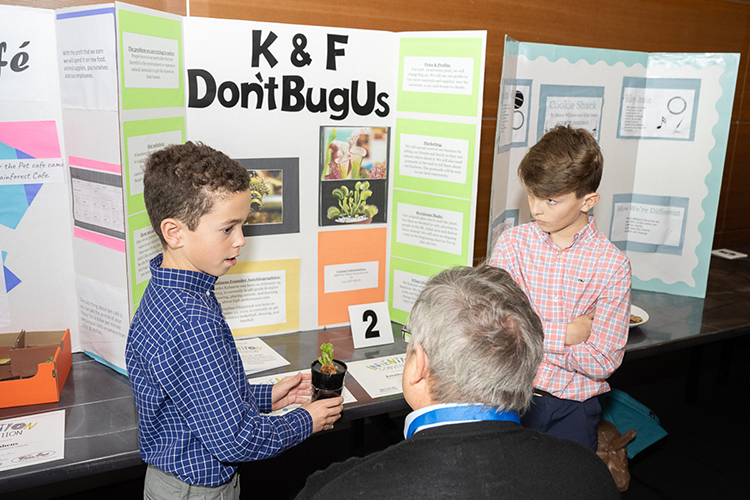
Longtime education professor Wil Clouse of the Clouse-Elrod Foundation, one of the Invention Convention’s sponsors, established an annual “Eagle Award” to encourage “maverick thinking.”
This year’s big winners included Walter J. Baird Middle School sixth graders Ady Ruis, Nataliyah Dowell and Livi Edwards of Lebanon, Tennessee, and Jack Burgess, a fourth grader at Murfreesboro’s Middle Tennessee Christian School. Their business plans for their “Love Yo Self” and “Jack’s Junk Agency” concepts, respectively, won both first-place trophies for the all-grades entrepreneur category as well as the two Eagle Awards presented by Clouse.
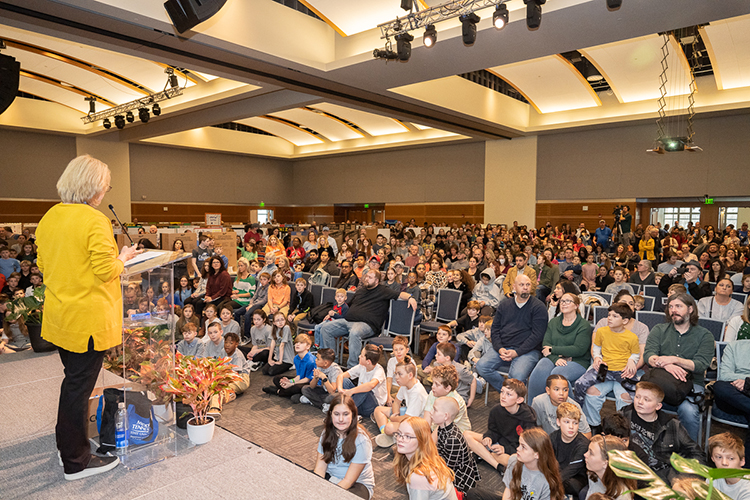
Local winners have made their mark on the National Invention Conventions, too, bringing home multiple national honors that so far have included the 2016 Stanley Black and Decker’s “Cool Tool” Award and the 2017 Henry Ford Student Innovators of the Year.
A complete list of MTSU’s 2023 Invention Convention winners is available at https://bit.ly/MT2023InventionConventionWinners. The event program, which lists all the participants and their entries by grade, is available at https://bit.ly/MT2023InventionConventionProgram.
First- and second-place trophy winners also can attend and compete in the 2023 Raytheon Technologies Invention Convention U.S. Nationals, set June 7-9 at the Henry Ford Museum of American Innovation in Dearborn, Michigan.
“This is what the Invention Convention is all about: creativity, having fun while making the world a better place and having family and friends around you to support and love you through the process!” Huddleston said.
Everyday inventions, special speakers
Since the fifth Invention Convention in 1997, each event has also had a “featured invention” — an everyday object for which Huddleston and her team provide a quick history and presentation. Each participant goes home with one of the featured items, which have ranged from golf balls to earbuds to dice to Solo Cups, all customized with the Invention Convention name and date and the MTSU wordmark.
For the 30th anniversary, Huddleston brought back that inaugural invention: the Frisbee, this time in distinctive MTSU blue and with the additions of the logos for the Clouse-Elrod Foundation and co-sponsor Wilson Bank & Trust, as well as the Business Innovation and Entrepreneurship Program in MTSU’s Jones College of Business.
Education graduate students and convention staffers Maggie Smith and Marissa Capuano told the youngsters that the toy originated as a tin pie plate tossed by college students in the early 20th century and appeared in its plastic, better-flying form in 1948. The 2023 conventioneers quickly used their Frisbees in both incarnations, flinging them down aisles between invention displays, then turning them upside down to corral their snacks.
Along with a featured invention, each event also showcases at least one guest speaker, which have included astronauts, artists, athletes, musicians, scientists and historians, and in recent years, the young inventors’ peers.
Guest speaker Jeremy Winters, an education professor who specializes in math at MTSU, encouraged the youngsters to find multiple uses for items to serve their needs, just as he’s done.
The lifelong athlete, who developed a degenerative visual condition in childhood and ultimately couldn’t continue his competitive athletic life alone, learned about paratriathlon competitions, where visually impaired athletes like him can team up with sighted guides to participate.
He dove into the challenge, ultimately becoming a silver medalist in the 2013 London ITU Paratriathlon World Championships. His challenges were more than visual at first, however, and he told the conventioneers how he made or sought out less-expensive gear to participate safely without going broke.
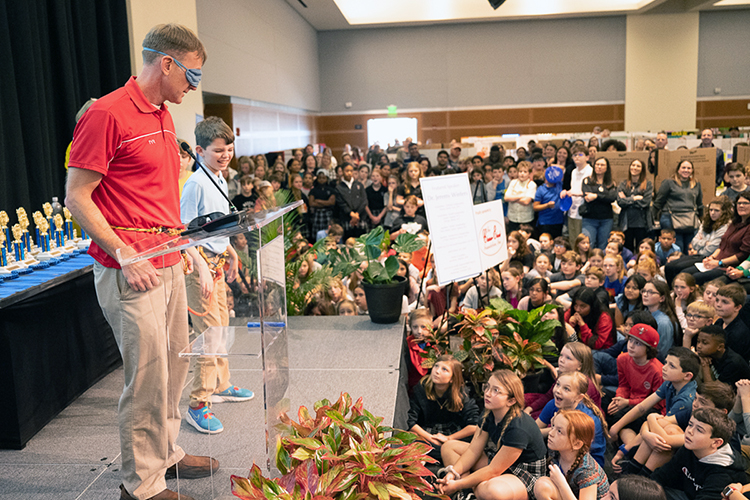
Winters displayed the tangled configuration of bungee cords he wove together so he and his guide could meet his early competitions’ safety requirements. He told of the secondhand bike and plain T-shirts that served the same purposes as his fellow athletes’ competition-specific bikes and fancy racing suits, using the mantra he developed and that the children quickly learned to echo: “Well, might as well TRY!”
He soon set up his own 501(c) 3 nonprofit so he could accept small donations to maintain and replace equipment for competitions, help pay travel expenses for him and his guide, and the like.
“My hope is that you’ve seen some simple things, like personal inventions, and some complex things, like the bike and the 501(c) 3 entrepreneurship, and how they’ll succeed,” Winters told the attendees. “I think they’ll always succeed if you have a purpose of helping others. My main goal, though, is to remind you that you’ll never succeed unless you … what?”
“TRY!!” the convention participants shouted back.
You can learn more about MTSU’s Invention Convention at www.tninventionconvention.org. The national convention website is https://inventionconvention.org.
— Gina E. Fann (gina.fann@mtsu.edu)
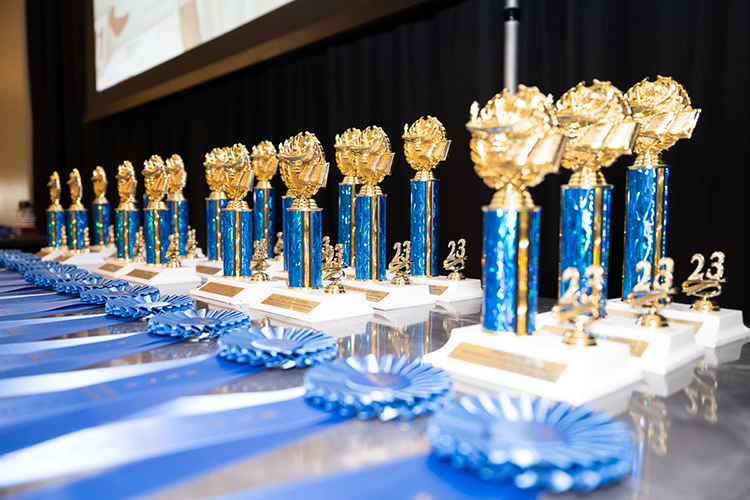

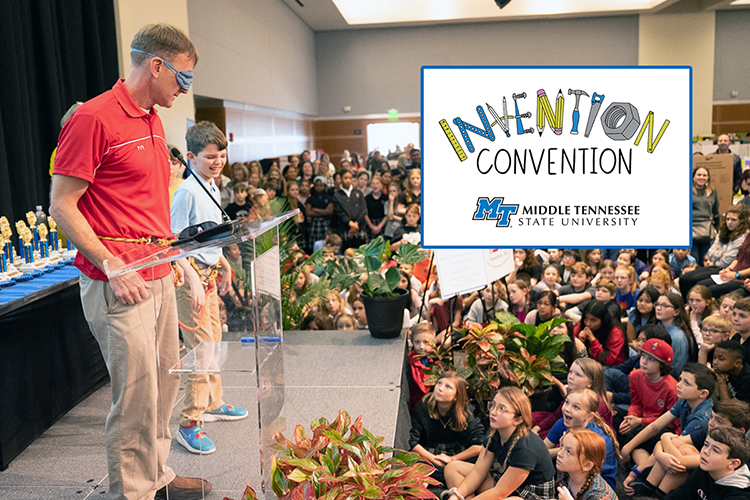
COMMENTS ARE OFF THIS POST